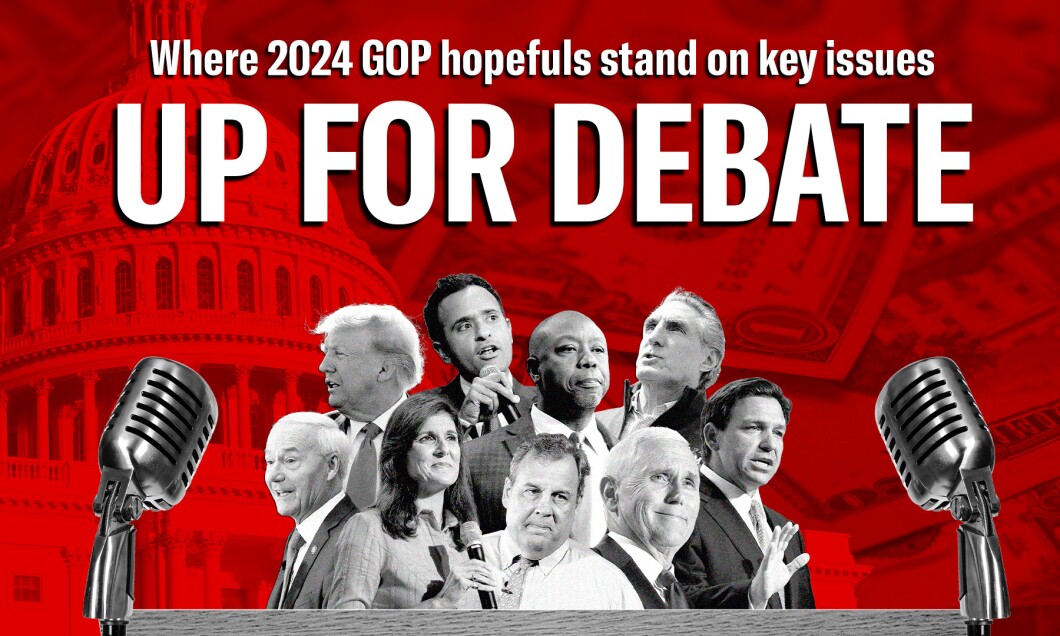
The first Republican presidential debate is fast approaching on August 23rd, where candidates will hope to close the gap on former President Donald Trump and separate from the rest of the pack. In this series, Up For Debate, the Washington Examiner will look at a key issue or policy every day up until debate day, and where key candidates stand. Today’s story will examine spending and debt.
The economy will be a big topic of conversation during the first debate of the GOP primary season.
Many of the Republican candidates for president have hit out at President Joe Biden for adding to the national debt since being sworn into office. Notably, Biden and Democrats oversaw a rash of spending early on in the form of pandemic relief and continued that with other legislative packages.
The country is staring down nearly $33 trillion in national debt, a number that is only projected to grow in the coming years and decades.
The Congressional Budget Office recently projected public debt will balloon to 107% of the country’s gross domestic product by 2029 and a whopping 181% by 2053. By the end of this year, federal debt held by the public will equal 98% of GDP, according to the annual CBO report.
Earlier this year, the CBO projected that the federal budget deficit will rise to $1.4 trillion in fiscal 2023, larger than previously projected and a reversal of the decline in deficits over the past few years as pandemic emergency spending wound down.

Donald Trump
Former President Donald Trump is a bit of an enigma when it comes to spending and debt. A large chunk of the coronavirus stimulus that Republicans have hit Biden for came while he was in office.
The national debt rose by nearly $7.8 trillion while Trump was in office, and the infusion marks the third-largest relative increase of a U.S. presidential administration, according to the Urban-Brookings Tax Policy Center.
Trump and his allies are quick to point out that much of that came as a result of the pandemic, an unprecedented event that upended the country in the lead-up to the 2020 election.
Perhaps the most consequential policy package to come out during the Trump presidency was the 2017 Tax Cuts and Jobs Act. The bill slashed the corporate tax rate to 21% and initiated a wide range of changes to individual taxes, including lowered tax rates, a larger child tax credit, and a nearly doubled standard deduction.
If the provisions are extended in 2025, doing so would add more than $2.5 trillion to the deficit through 2032, according to the Penn Wharton Budget Model, which uses data sourced from the Congressional Budget Office.
The country’s national debt and spending came under renewed scrutiny this year during the fraught fight over the debt limit. There was dissension within House Speaker Kevin McCarthy’s (R-CA) own party as a result of the agreement made with the White House, with some lawmakers bashing the plan as not going far enough to rein in spending and tame the deficit.
Although quiet about the deal and negotiations for some time, Trump was among the candidates who expressed misgivings about the plan. During a CNN town hall, the former president also thought Republicans should go to hard-line tactics, even default, in order to exact spending concessions from Democrats.
“I say to the Republicans out there, congressmen, senators, if they don’t give you massive cuts, you’re going to have to do a default,” Trump said at the time. “And I don’t believe they’re going to do a default because I think the Democrats will absolutely cave, will absolutely cave because you don’t want to have that happen.
“But it’s better than what we’re doing right now because we’re spending money like drunken sailors,” he added.
Social Security and Medicare, the country’s biggest entitlement programs, are major spending items and are at times in the crosshairs of economic conservatives. Trump, though, has taken up the mantle of defending the programs. He has urged the GOP to leave Medicare and Social Security alone and to back away from any plans to cut the popular programs.
Ron DeSantis
Gov. Ron DeSantis (R-FL) has sought to paint himself as a conservative purist on spending and deficits, contrasting Trump’s presidency with his time leading Florida.
“He promised to eliminate the national debt when he ran for president. He added almost $8 trillion,” DeSantis recently said. “In Florida, we’ve actually reduced our state debt since I’ve been governor by almost 25%.”
Gov. @RonDeSantis outlines his disagreements with Trump:
“He attacked me for voting against an amnesty that he was proposing when he was president. I opposed the amnesty. He tried to do a two million person amnesty. He promised to eliminate the national debt when he ran for… pic.twitter.com/UnKYvLdqyc
— Never Back Down (@NvrBackDown24) July 28, 2023
Last month, DeSantis released what he dubbed the “declaration of economic independence,” which is basically the forward-looking economic agenda for the campaign. One of the points on the fact sheet for the plan is “fighting reckless and wasteful federal spending.” The campaign also said DeSantis will push to mandate work requirements for welfare programs.
DeSantis was a major critic of the McCarthy-Biden debt limit agreement. He said that the deal didn’t go far enough to solve the country’s fiscal dilemma.
“Our nation was careening towards bankruptcy before the debt deal, and it will still be careening towards bankruptcy after this debt deal,” DeSantis said during a campaign event in Iowa.
Unlike Trump, DeSantis is open to enacting changes to the Social Security and Medicare programs, although he has said that any changes would not affect seniors. During a recent interview with Fox News, he suggested changes to Social Security could affect younger generations.
“Talking about making changes for people in their 30s or 40s so that the program’s viable, you know, that’s a much different thing, and that’s something that I think that there’s going to need to be discussions on,” the Florida governor said.
Tim Scott
Sen. Tim Scott (R-SC) has also cast himself as a fiscal conservative. He bashed the pandemic-era spending by the Biden administration as Trojan-horse legislation that was used to push through a “progressive wish list” of spending items under the cover of COVID-19 relief.
Scott, who supports a balanced budget amendment, was critical of the debt limit agreement that was crafted by McCarthy. He ended up joining 31 other Senate Republicans (and four liberal Democrats) in voting against it.
“The question I asked myself is, ‘At the end of the negotiation, is it in our best interest as a nation to allow Joe Biden, someone we cannot trust on spending, to have an open checkbook, no limit on the credit card until the end of his term?’” Scott said during an Axios event, adding that the answer was “no.”
Nikki Haley
Former South Carolina Gov. Nikki Haley, who also served as Trump’s ambassador to the United Nations, has also emphasized the need for the federal government to get its spending under control and rein in the deficit.
She has blamed both parties for spending so much. Haley isn’t a fan of earmarks, which were revived in 2021, and has attacked them as the “gateway drug to higher spending.” She has also vowed to veto any legislation that doesn’t guide the U.S. back to pre-pandemic spending levels and wants to claw back federal pandemic funding that hasn’t already been spent.
“We need a president who will do what no one has done to date: Stand up to the big spenders in both parties,” Haley said in a May op-ed.
Vivek Ramaswamy
Vivek Ramaswamy, an entrepreneur who rose to prominence for his vociferous opposition to corporate environmental, social, and governance investing, has pushed for ways to boost GDP growth, something he contends will help alleviate some of the country’s fiscal woes.
He proposes a “third way” to put the U.S. back on track that isn’t the binary between raising taxes, which Democrats generally prefer, and slashing funding like entitlements, which Republicans generally prefer. He thinks more GDP growth can be unleashed by unlocking increased U.S. energy production, reforming the Federal Reserve, and cracking down on the administrative state.
“Unleash American energy. Put people back to work. Reform the Fed. Restore a culture of merit,” Ramaswamy said on social media. “If we grow at 3-4% again, most other problems disappear. I’m shooting for 5%. We can do this.”
Others
Most of the other Republican presidential candidates, who are largely polling in the single digits, support more traditional fiscal conservatism.
Former vice president Mike Pence told NBC News in May that the Trump administration “could have done a better job” at keeping the federal debt down.
CLICK HERE TO READ MORE FROM THE WASHINGTON EXAMINER
Chris Christie, the former governor of New Jersey, has broken with some of the other contenders in pushing for entitlement reform, citing the federal debt.
“We have to look at things like means testing for the very wealthy [who] don’t need to get Social Security,” Christie told CNBC in June. “And secondly, for people in their 30s and 40s we need to consider, you know, raising the retirement age.”





